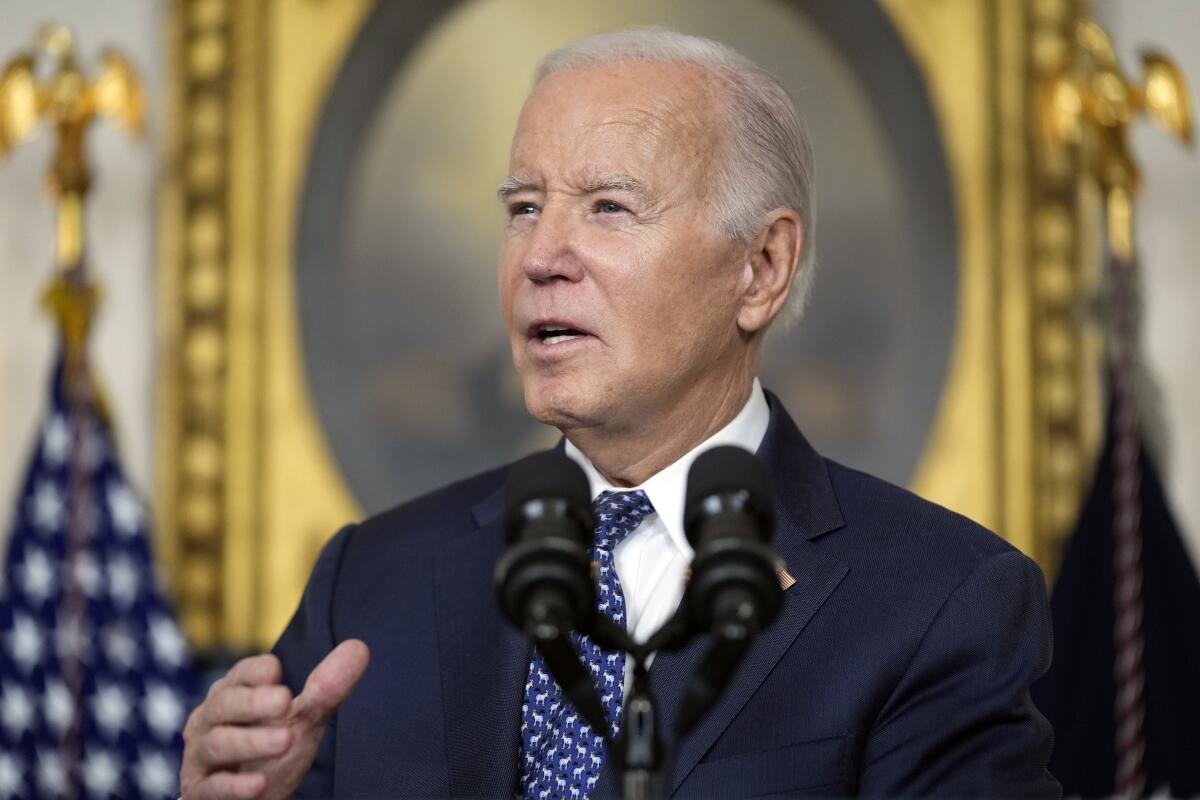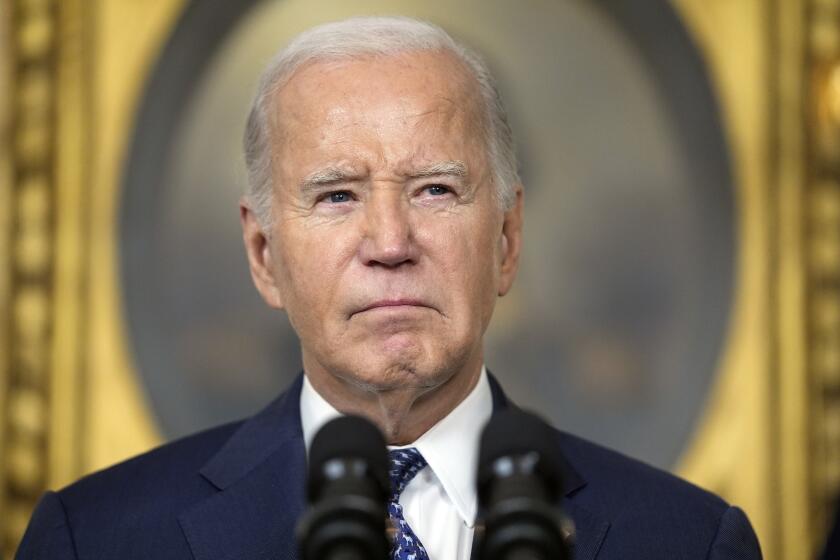Column: Is Biden impaired? Is Trump? Experts don’t know, but the issue is here to stay

- Share via
There’s no escaping it now.
We are a deeply divided country in the midst of a presidential campaign in which the mental acuity of an 81-year-old sitting president will be one of the central issues through November, possibly eclipsing the economy, climate change, immigration and reproductive rights.
This is happening in the middle of an unprecedented demographic shift, just several years out from the first time in human history in which people 65 and older outnumber people 18 and under, with many millions of people suffering the harrowing experience of memory loss.
It’s a moment that can serve as an opportunity to invest in more research, educate the public on early detection and treatment and fortify resources for patients and their loved ones. Or it can be a time to exploit and politicize cognitive loss or even mock it, as GOP candidate Nikki Haley has done with her new “Grumpy Old Men” ad campaign.
Biden’s memory sometimes fails. Trump’s does, too. Voters face a choice between two elderly men with flaws. But the problems they pose aren’t equal.
Questions about President Biden’s mental and physical health — as well as that of civility-impaired former president and likely opponent Donald Trump, who is 77 — were already part of the political conversation, with critics of Biden proclaiming him unfit. But the issue became magnified after Thursday’s report on Biden’s handling of classified documents, in which a special counsel called the president a “well-meaning, elderly man with a poor memory.”
The Trump team pounced, with strategist Chris LaCivita telling the New York Times the special counsel report is “damning and defining.” Well, OK, but if mental fitness is the issue, let’s not forget that LaCivita’s guy lost the last presidential election decisively but still thinks he won.
Biden didn’t help his cause Thursday night when he proclaimed “my memory is fine,” only to then refer to the president of Egypt as the president of Mexico. This followed two recent similar gaffes involving the leaders of France and Germany.
We could be in for months of this, exploring new frontiers in the post-sanity of American politics. When Biden speaks, you hold your breath. When Trump speaks, you shake your head.
The miscues by Biden are alarming, no doubt, especially when you consider that if reelected in November, he’ll be serving in his mid-80s. But what are the options for Democrats? In theory it should be easy enough to beat a former president who whiffed on virtually every top campaign promise — healthcare reform, a national infrastructure plan, the return of manufacturing, the draining of the corruption cesspool and a wall paid for by Mexico.
If Biden’s handlers hide him, that could hurt. If they push him in front of cameras, that could hurt more. Is the plan to keep a low profile, hope for a win, and then hand the baton to Vice President Kamala Harris?
We just don’t know, but it is worth noting that the special counsel who diagnosed Biden is a lawyer, not a doctor. And frankly, we don’t know if what we’re seeing in Biden’s public moments is normal aging of the brain, or what’s called mild cognitive impairment, which can be an early sign of a disease that can lead to dementia.
“Mistaking someone or misspeaking doesn’t mean you have dementia,” said Dr. Zaldy S. Tan, director of the Cedars-Sinai Memory and Healthy Aging Program.
As we age, Tan said, “we have some changes associated with information processing. The speed … slows down. That’s part of normal aging. Mentally, we won’t be able to pull out that information as quickly as we once did if someone is asked a question or rapid-fire questions. We need more time to process that information.”
Without a full exam and neurological testing, as well as a look at how Biden functions behind the scenes day to day, Tan said, it’s not possible to make a clinical diagnosis.
“I think it’s important for the public to know that someone in their later years may not be as quick and snappy as someone who is younger, but it doesn’t mean they are not capable of doing a job. It depends on what the job is and whether speed of thinking is paramount, or whether experience and wisdom” are more important, Tan said.
Debra Cherry, a clinical psychologist and executive vice president of Alzheimer’s Los Angeles, echoed Tan on the danger of long-distance diagnoses.
“I don’t have any reason to believe that Biden has any sign of cognitive impairment, and I don’t have any reason to believe that Trump has cognitive impairment,” Cherry said.
California’s primary election takes place on March 5. Read up on the races in L.A. city, L.A. County and other areas.
There once was, however, a president who was a bit easier to assess.
“I think back to when Ronald Reagan was in office and he showed many more signs of cognitive impairment before he was finally diagnosed,” Cherry said.
Professor Margaret Gatz, an Alzheimer’s researcher who’s been at USC since 1979, said she objected to the special counsel calling Biden elderly and forgetful, as if the one guarantees the other. One person might be fuzzy at 60 and another sharp at 90.
Gatz said people with cognitive impairment or even mild dementia find ways to compensate and continue normal function — they might put the car keys in the same spot every time they return home, for instance.
“If you ask someone to remember a list of 16 words and see how many they can say back, even if they can’t do that very well, it may have little or no implication for their decision making in other areas of life,” Gatz said. “If Mr. Biden cannot reel off the names of the capitals of every country he’s been to, that does not have implications for whether he can think clearly, creatively and decisively about how to handle crises and policy decisions.”
Gatz did add, however, that in the abstract, she has “a concern with anyone who’s 80 years old being president of the United States,” because “with aging, all people lose a step here and there.”
Well, it looks like almost a sure thing that someone 80 or older — Biden or Trump — will be the next president.
Maybe instead of a series of debates, we should demand a battery of neurological testing.
More to Read
Sign up for Essential California
The most important California stories and recommendations in your inbox every morning.
You may occasionally receive promotional content from the Los Angeles Times.













